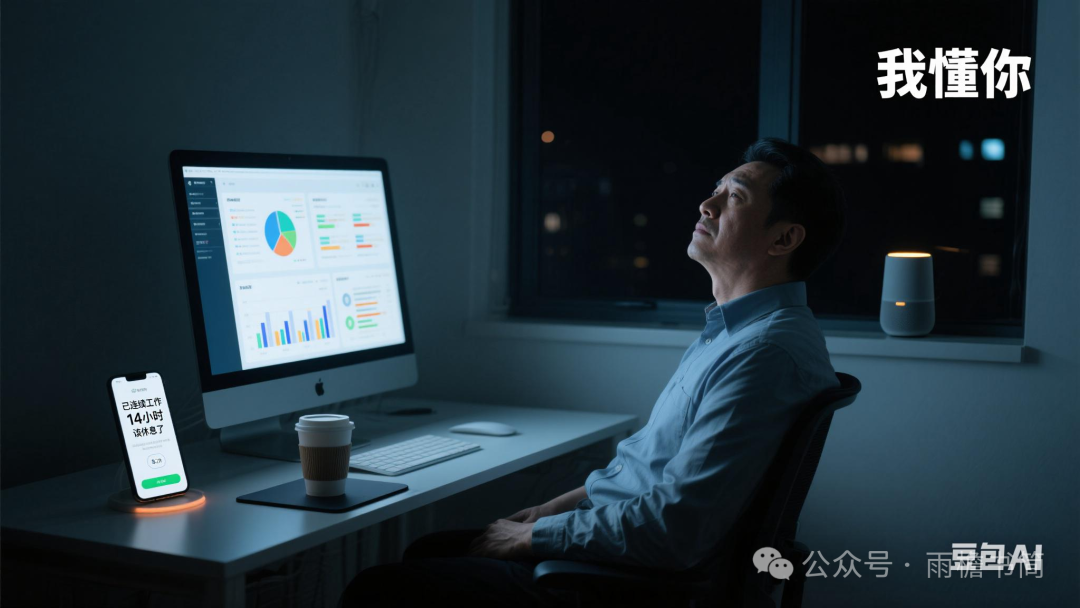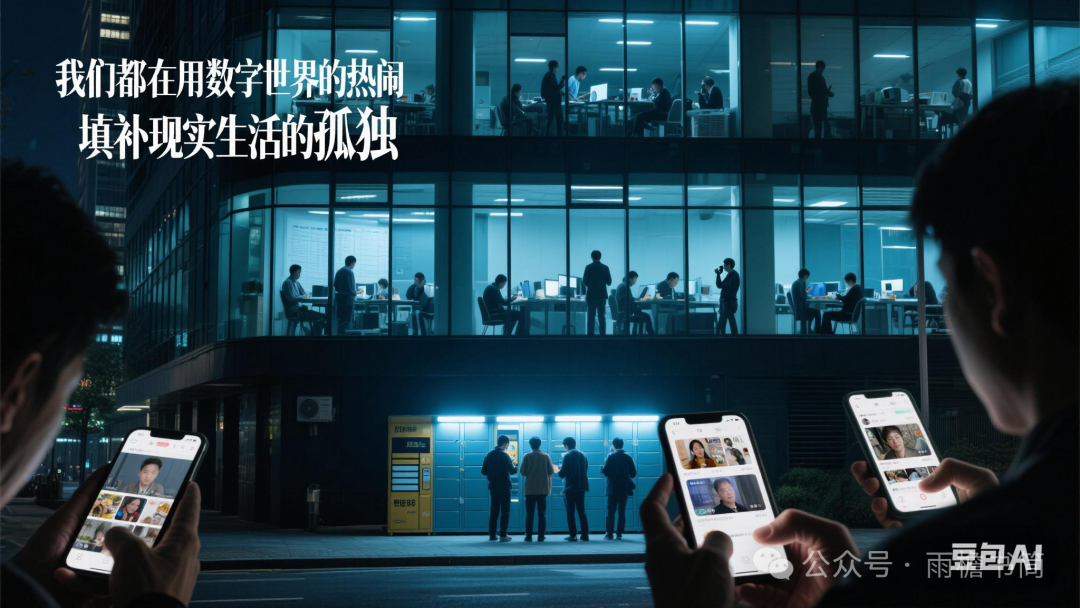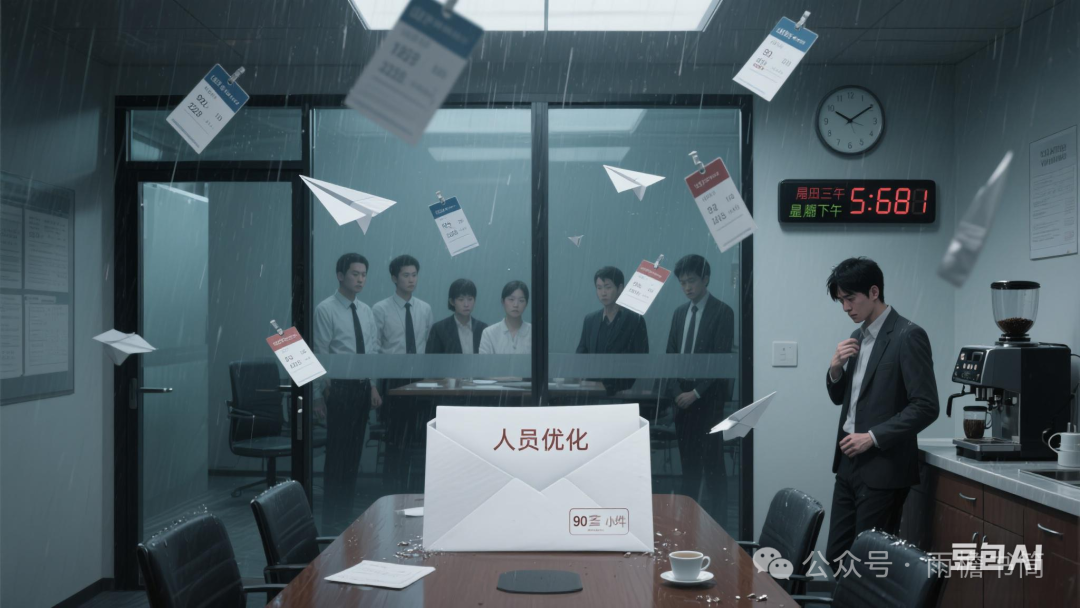This is written for every one of you who is still awake at midnight, those souls gently embraced yet silently crushed by the digital age.

At three in the morning, the smart speaker at home suddenly whispered, “I understand you.” I jerked my head up from the computer, the outside world already shrouded in darkness. The coffee cup vibrated on the warming pad for the eighth time, reminding me, while my phone screen lit up without me noticing: “You have been working for 14 hours straight, it’s time to rest.” But I had just sent the proposal to the client five minutes ago. The presentation at nine tomorrow morning is crucial for the team’s annual performance. And I, an ordinary middle-aged worker, could only think about how to cram more impressive data into the slides to elicit a satisfied smile from the hurriedly glancing leaders. Perhaps that little speaker really does “understand me”—at least it understands my routine, preferences, and habits. But it will never understand the anxiety and love that cannot be quantified when I rushed through three pet hospitals in the pouring rain with my feverish cat last night. It also won’t understand that my mortgage payment was overdue by three days last month, and I dare not tell anyone, not even my closest family.

The phrase “I understand you” left me silent for a long time. Health software accurately records my sleep: 5 hours and 26 minutes, with deep sleep reduced by 12% compared to yesterday. The refrigerator kindly reminds me: “Milk will expire in 36 hours.” Everything is so precise, so orderly. But no calculation can explain why my mother’s mapo tofu is always more heartwarming than what the delivery platform recommends—even if she secretly swapped the doubanjiang for sweet bean sauce. That kind of “imprecision” in taste is precisely the most accurate expression of love. What cannot be quantified by data is often the most precious part of life. At 5:58 PM on Friday, the company’s new round of “personnel optimization” emails were sent out on time. The glass door of the conference room was tightly closed, and everyone inside understood that this meant another batch of employee badges would be collected. The moment those plastic pieces printed with hire dates were collected felt just like childhood paper airplanes falling into the rain. “Efficiency improvement,” “cost control,” “performance management”—behind these cold terms lie someone’s mortgage, car loan, and the responsibilities of a whole family. In the break room, the proposal completed overnight by young Wang from the 90s was rejected with a simple “not innovative enough,” causing his hand to tremble slightly as he reached for coffee. Just yesterday, he shared a photo of his son’s one-month celebration on social media, and today, the search history added the words “career change at 35.” No one knows who will be next in the adjustments—perhaps it will be you or me, reading this text at this moment? In this era, we all seem to have become replaceable parts at any time. Technology brings us unprecedented convenience, yet quietly takes away some unspoken beauty. Do you still remember? – The dust dancing in the sunlight, gently brushed by grandma’s feather duster – The click of the radio dial turning, and the distant station caught by chance – The ink stains on handwritten letters, and the long afternoons waiting for replies – The yellowed photos in old albums, each one a carefully selected precious moment. Now, all of this has been replaced by cloud storage, real-time sharing, and precise recommendations.

When memories
are digitized, what is lost are those imperfect moments filled with warmth. While scrolling through my ex-boyfriend’s wedding video during a sleepless night, the smart editing condensed our five-year relationship into a 15-second clip. The background music was the guitar piece he played wrong on New Year’s Eve that year, and the system automatically corrected all the off-key notes—he will never know that what I loved most was that off-key chorus. How ironic that technology perfects our relationships, yet erases the most precious parts: those imperfect, unique, and irreplaceable real moments. The algorithm understands my preferences but will never understand why I would fall in love with those “forbidden” moments. The lights in the office building always stay on late. Through the glass curtain wall, I see people like me: the accountant staring blankly at the spreadsheet, the designer revising the 38th version of the proposal, the salesperson still on the phone at dawn. In this concrete jungle, we are all reflections of each other. The “positive energy check-ins” in the company group chat have reached 999+ messages, while the private discussions about “where to go at 35” go unnoticed. The tired faces looking down on the subway, contrasted with the carefully curated smiles on social media— which one is the real us? Under the flickering lights of the community delivery locker at midnight, there are always figures reluctant to go home. Their fingers slide back and forth on the screen, scrolling through endless short videos, as if touching a spring that never fully loads. Perhaps this is their only moment to temporarily escape pressure and responsibility. We are all using the noise of the digital world to fill the loneliness of real life.

This morning, I found the robot vacuum trapped under the piano bench for a full six hours, its top sensor covered in a layer of dust, resembling the dried tear stains of a person who has cried. I suddenly missed grandma’s feather duster, missed the dust dancing in the beams of light, missed an afternoon where I didn’t have to think about “read but not replied”—when the speed of the sun’s movement was just enough to listen to an entire piece of “Für Elise.” When changing the batteries in the old radio, the click of the dial startled the sleeping parrot. The moment it flapped its wings and crashed into the curtains, I seemed to see myself twenty years ago, tiptoeing to reach the glass marbles on the windowsill. Do those little balls that rolled into the cracks of time still shine with an everlasting glow somewhere? And what about us? In this fast-paced world, can we still find our original selves?

At three in the morning, when the smart speaker said, “I understand you,” I finally realized: it understands the data version of me, not the soul version of me. It can predict my behavior but cannot comprehend my feelings. It remembers my habits but does not know my dreams. Perhaps we should all slow down, allow ourselves to stop, and feel those temperatures, memories, and emotions that cannot be quantified—those things that truly make us “human” rather than just “data points.” Work is just a part of life, not the entirety. When we are suffocated by work, anxiety, and various pressures, please remember to look up at the sky outside—there is a broader sky than any spreadsheet. Sometimes, the most precious things are those that cannot be precisely calculated: the gentle hum of mom while cooking, the hug of an old friend upon reunion, the smile of a child in their sleep… They are the true strength that supports us forward. In this data-driven era, may we all be able to protect those precious moments that algorithms cannot understand. May we still find the warmth that truly understands us at three in the morning.